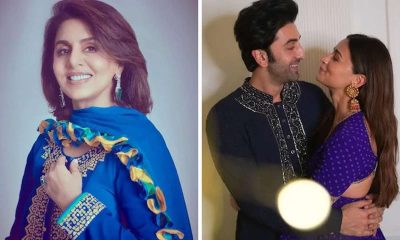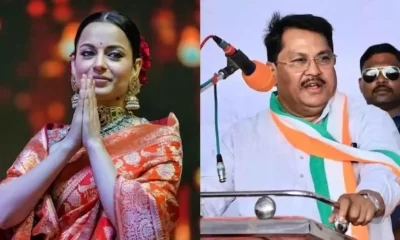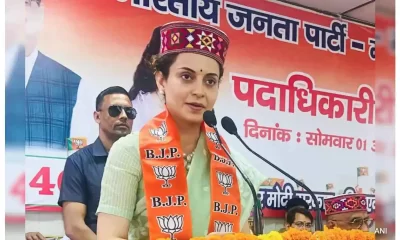Latest Art & Culture
Unfair and Still Lovely

[vc_row][vc_column][vc_column_text]There’s a new chorus of voices against skin colour discrimination in contemporary urban India
By Mrinal Verma
“Fairness in a month!”
“Fairness in 15 days!”
“Fairness in 10 days!”
The shorter the time period, the higher the number of buyers because, after all, there is only one thing that India loves more than our cricket and our Bollywood: our obsession with a fair skin. It is no surprise that Indians are obsessed with the very idea of having a lighter skin tone. A person’s worth is directly linked to the melanin in their skin. With us being Indians you’d think that we’d accept our own selves and not willingly gorge on the idea of beauty that has been created on a Eurocentric perception of the world, but stranger things have happened in this country.
From a very young age, every member of Indian society has either been congratulated for having a fair skin or handed bottles or tubes of soaps, face wash, creams, foundations, and even deodorant that claimed to fix their melanin in a short time, also promising jobs and marriage proposals and various other things that a dark-skinned person could never get. How many times have we watched our beloved Bollywood celebs having their skin tone miraculously lightened in the 15 seconds for which the ad is on air? How many times have we heard songs praising fair women, like “Chittiyaan Kalaiyaan”, “Gori Gori O Banki Chhori”, “Gore Gore Mukhde Pe Kala Kala Chashma”, “Chura Ke Dil Mera Goriya Chali”… and the list goes on. Bollywood’s obsession with fairness is nothing hidden or new. Actresses like Kajol, Priyanka Chopra, Yami Gautam, Anushka Sharma, Sonam Kapoor and many more have lent their faces to further the delusion of this preposterous belief, and our dashing Bollywood heroes aren’t lagging behind either, with Shah Rukh Khan, Shahid Kapoor, John Abraham and others selling fairness creams with promises of “getting all the ladies”.
Bollywood celebs like Kajol, Shilpa Shetty and Rekha, amongst others, have also indulged in skin lightening treatments. A change can be seen in the skin colour with which they entered the industry and what they are endowed with now, being propped up as the ideal face of beauty in our society. Such things can also be noticed on the big screen in films like Mohenjo Daro in which the dark-skinned Pooja Hegde was presented as a white-as-chalk heroine. Even actress Rimi Sen proved her ignorance when she made a comment like “He (Rohit Shetty) can make even a black African look pretty.” Many celebrities have themselves faced this discrimination firsthand and have talked about it in their interviews. Anand L Rai, director of the movie Raanjhanaa, was questioned again and again for picking Dhanush as the lead. “I was told the hero has to be fair and good-looking as that is what the audiences want today, particularly in North India,” he said. Usha Jadhav, a National Award winning actress, talked about how she struggled in her early days because of Bollywood’s obsession with a fair skin. She said: “Many producers refused to cast me because of my skin colour. They’d say they wanted a fair girl to play the heroine.” Nandita Das, who has openly supported campaigns like Dark is Beautiful and Brown n’ Proud, also sheds light on the problem that persists in the film industry: “We keep saying things like, ‘uska rang saaf hai’ as if dark skin is a dirty thing. This mindset is then propagated in our songs, stories, and movies.”
In a society that sells crayon boxes with peach tagged as “skin colour” when, in fact, the majority of Indians are dark-skinned and with “nude colour” also being the ideal light skin, such ideas of believing in the superiority of a light skin are so deeply embedded in the Indian mindset that the public accepts them as facts. With technology being as advanced as it is, a large number of beauty apps are being promoted with features that will “brighten” and “lighten” your skin colour, so if you cannot achieve your ideal light self in real, at least you can do it in the various selfies you post on your Instagram account!
But, thankfully, long gone are the days when such systematic teaching was accepted and appreciated by everyone. A new voice has developed which is not just questioning such factors but rebelling against them. Over the last few years many NGOs, campaigns, projects, and individuals have raised awareness and fought against the skin colour discrimination that is so rampant in India. The problem also does not stop there. Such a problem exists in almost all countries having people of colour. The craze for a fair skin has gotten out of hand and, finally, various voices have been raised against it.
Unfair and Lovely, a campaign started by three students at the University of Texas, aimed to redefine the beauty standards that have been blindly followed in South Asian society. Pax Jones, the founder of the campaign, speaking to The Huffington Post, said: “#UnfairAndLovely is meant to be an inclusive space. It is for the dark-skinned, queer, trans, genderqueer, non-binary, poor, fat, differently abled people of colour.” The campaign asks people to post their selfies as a celebration of their dark skin. The campaign has thousands of followers on its Instagram page, and the number keeps growing day by day. They also had a #ReclaimTheBindi week from March 8 to 14, teaching people about cultural appropriation.
Joanna Thangiah, a Sri Lankan artist, has created illustrations dealing with the issue of feminism, skin colour discrimination, body positivity, and mental illness. Talking to Buzzfeed, she said: “I was raised thinking that having darker skin and too big a nose was ugly. As my mother put it, I’ve been ‘blessed’ with ‘fair’ skin, yet anytime I went out into the sun and came home a little darker, I would get called ugly.” Famous blogger Santoshi Shetty also commented on the issue whilst talking to Humans of Bombay: “So many times people have commented on my photos, saying, ‘she’s so dark, how is she a blogger?’, or ‘I’ve met her, she’s much darker than this photo’…It was through my journey that I began to become comfortable with myself — scars, skin colour and criticism alike.”
To fight the issue Kochi artist PS Jaya engaged in a “100 day blackened body” protest from January 27 to May 5, 2016, when she painted her body with grease to highlight the stigma relating to a dark skin. Her complaint lay in the fact that Indians continue to view dark-skinned people with suspicion. Dimple Gulrajani uploaded a monologue on her YouTube channel titled Dear Indian Aunties which has gathered more than 3,000 views till now.
Dear Indian Aunty,
can you not see
while you promote fair and lovely,
your daughter
and thousands like her
trying to impress future grooms
are locked in their bathroom
trying to scrub away the brown
till their tears are drowned
in a soapy sink,
vain to the dark ink
that writes their destiny.
A new wave in the fight was seen when a customer named Nikhil Jain filed a complaint against Fair & Handsome for false advertisements and promises. The results were that the District Consumer Disputes Redressal Forum (Delhi) directed Emami Ltd to withdraw these advertisements and to deposit Rs 15 lakh as damages with the Consumer Welfare Fund. The popular campaign Brown n’ Proud started a petition online against Hindustan Pencils Pvt Ltd in 2013, asking them to change the name of their “skin” colour crayon, which was actually a shade of peach. The campaign gained more than 3,000 supporters. It stated that tagging a light coloured crayon as skin coloured not only showed our country’s obsession with painting our ideal selves as light-skinned, but also how such crayons do not match the actual skin colour of the people to whom they are marketed. It also appealed to Navneet Education Limited who agreed to change the name of their crayon and relaunched the product. Hindustan Pencils’ Apsara Wax Crayons were relaunched in 2015 with a change in the name of the “skin” crayon to peach.
Talking about Brown n’ Proud, Chirayu Jain, the founder, said: “The trigger took place at Bangalore Airport in May 2012. I was there with my dad and I stopped by a stall that was inviting travellers to ‘revisit their childhood’ by handing out crayons and sheets. I couldn’t help noticing and thinking over and over again about the crayon that I was using to colour the skin parts. It was the one that was labelled ‘skin’, but hardly matched mine. The brown colour was right there, yet somehow at that moment, it felt like a wrong shade to be used for representing skin on paper. That got me thinking, and a month later when I called up my friends and discussed the idea, they were all very supportive. And thus Brown n’ Proud was born.”
Slowly but surely, even Bollywood is waking up and changing its mentality, with many names having questioned, bashed, and rejected fairness creams. The latest one to do so is Abhay Deol who took to his Facebook page to not only call out the use of fairness creams but his fellow actors who engaged in endorsing such products. Actors like Kangana Ranaut, Ranbir Kapoor, and Esha Gupta have openly refused to promote skin lightening products. Even Priyanka Chopra, who has been an active ambassador for various beauty products, regrets promoting a fairness cream in the past. Talking to Glamour, she said: “A lot of girls who have a darker skin hear things like, ‘Oh, poor thing, she’s dark. Poor thing, it’ll be hard for her.’ In India they advertise skin-lightening creams: ‘your skin’s gonna get lighter in a week.’ I used it when I was very young. Then when I was an actor, around my early twenties, I did a commercial for a skin-lightening cream. When I saw it, I was like, “Oh shit. What did I do?” And I started talking about being proud of the way I looked. I actually really like my skin tone.”
Though the road to freedom from such a mindset is long and tough, the new voices rising are questioning the lies that have been taught to us as facts. The present generation is becoming smart, active, and unwilling to have their insecurities fed on. All the wide-ranging support that resisting voices have been gaining is proof that Indians are becoming aware of their own exploitation, internalised self-hatred, and are coming out to point out this discrimination and love their own selves —fair or unfair.[/vc_column_text][/vc_column][/vc_row]
Entertainment
Yashraj Mukhate collaborates with Amit Trivedi for Mann Dhaaga song
In a post circulating on Instagram Yashraj Mukhate talks about his experience of listening to Amit Trivedi’s music and recalls how he had always dreamt of collaborating with Amit Trivedi. He said his dream came true 2 years later in 2024 where he collaborated with Trivedi on the song Mann Dhaaga.
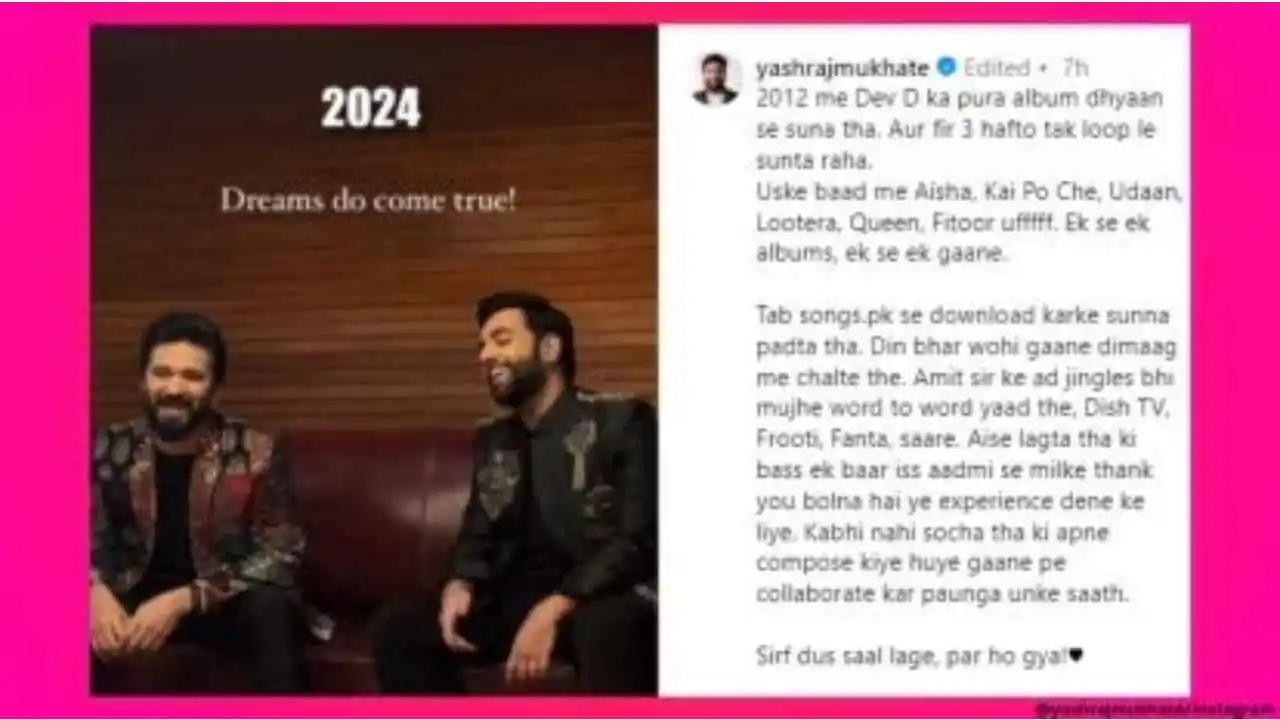
Amit Trivedi is known for his soulful compositions which weave profound lyrics, captivating music lovers. His songs spark a deep desire in aspiring artists to collaborate with him. Music producer and You Tuber Yashraj Mukhate had immense admiration for Trivedi’s artistry. In a post circulating on Instagram Yashraj Mukhate talks about his experience of listening to Amit Trivedi’s music and recalls how he had always dreamt of collaborating with Amit Trivedi.
He said his dream came true 2 years later in 2024 where he collaborated with Trivedi on the song Mann Dhaaga. He wrote that he had been listening to the entire Dev D Album carefully in 2012. And he kept listening to it on loop for 3 weeks. He continued to listen to Amit Trivedi compositions in Aisha, Kai Po Che, Udaan, Lootera, Queen, Fitoor continuously. He said he could not stop himself and became a big fan of the music director. He said he started dreaming of meeting his idol one day and collaborating with him.
He recalled that he had to download songs from songs.pk and listen to them. He said the songs kept running inside his mind all through the day. He added that he even remembered Amit Trivedi’s ad jingles word for Fanta, Frooti, Dish TV and all of them.
Mukhate said he always dreamed of meeting Amit Trivedi and wanted to thank him for giving this experience. The post has gone viral on social media with 96,445 likes till now. Large number of social media user commented on the social media post where one user Parth said the Yashraj Mukhate was truly an inspiration. One user said his dedication had brought him to level. One user said a man should make all his dreams come true by going through one hustle at a time.
Book reviews
The Sattvik Kitchen review: Relook at ancient food practices in modern times
If you are the one looking to embrace healthy food habits without compromising on modern delicacies, then this book is a must read!
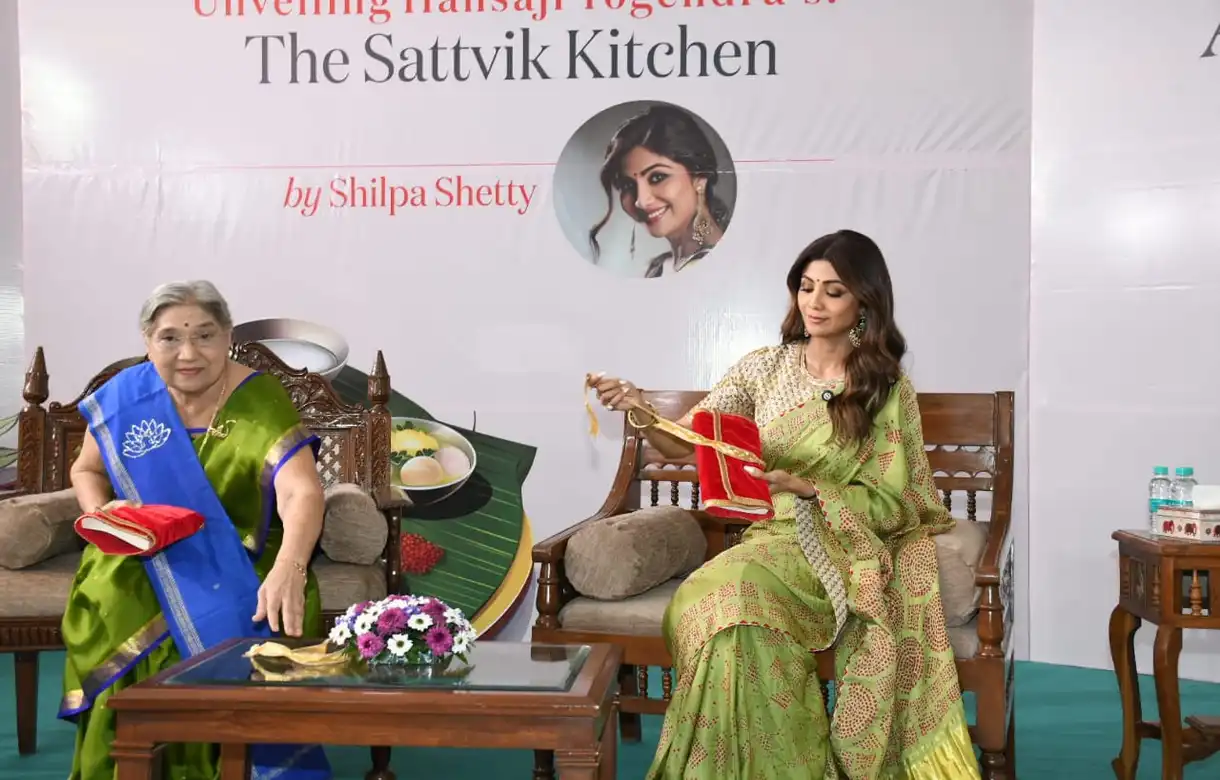
The cacophony of bizarre food combinations across the streets of India has almost taken over the concept of healthy food practices. Amid this, yoga guru Dr Hansaji Yogendra’s The Sattvik Kitchen, published by Rupa, is a forthright work that takes you back to ancient food practices and Ayurveda.
As the subtitle reads, The Art and Science of Healthy Living, the book endows a holistic approach to ayurvedic diet along with modern evidence based nutrition. From Basil-Broccoli Soup to Sprouted Green Gram Salad and Strawberry Oats Smoothie to Mixed Dal Parathas, the book not only provides you with the recipes but also stresses on healthy cooking tips together with nutritional benefits.
Besides, Dr Hansaji Yogendra’s book emphasizes on the traditional methods of food preparation and the advantages of using traditional cookwares like iron and copper vessels. The narrative portrays a balanced approach, knitting traditional wisdom with contemporary scientific understanding.
The author, through her book, sheds light on the principles of Ayurveda and highlights the metamorphic potential of adopting ancient food practices. She explains how our body reacts to food in terms of timing, quantity, manner of consumption and seasonal considerations. The book adeptly reintroduces ancient home remedies tailored to address various contemporary health issues.
Dr Yogendra, in her book, decodes the importance of nutritional knowledge to optimize both immediate and long-term health outcomes. It provides deep insights to understanding the intricate relationship between food choices and overall well-being, weaving Ayurveda with practical perception.
The book not only celebrates food philosophy but also offers a practical view into weight loss, well-being, and the profound impact of dietary choices on both physical and emotional aspects of our lives.
If you are the one looking to embrace healthy food habits without compromising on modern delicacies, then this book is a must read! The book is a roadmap to navigate the challenges of the modern day kitchens.
Book reviews
The Deccan Powerplay review: Bashing Chandrababu Naidu and his legacy
Amar Devulapalli’s book The Deccan Powerplay cornersthe TDP strongman with every petty incident exaggerated a la Baahubali
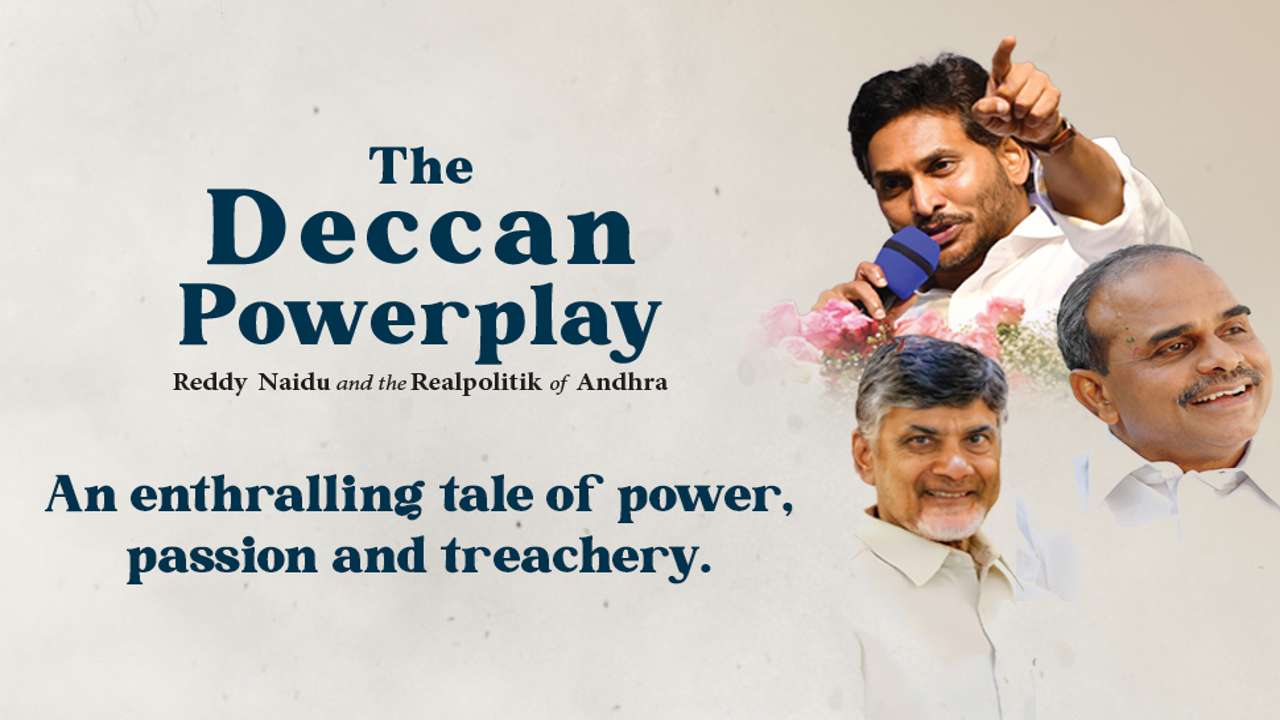
Mike Marqusee’s War Minus The Shooting is a seminal book on cricket and its influence on culture and politics in the Indian sub-continent during the 1996 Cricket World Cup. Amar Devulapalli’s book The Deccan Powerplay, published by Rupa, sounds like a similar exercise with its clear subtitle, “Reddy, Naidu and the Realpolitik of Andhra Pradesh“. The ambitious sounding subtitle crumbles under the weight of belied expectations of a scholarly treatise on the political interplay between the Reddys, the Kammas and the erstwhile united Andhra Pradesh. One can blame it on one’s own hopes and excuse the author of the lapse since the book has just three people to discuss: YS Rajsekhara Reddy, N. Chandrababu Naidu and Y.S. Jagan Mohan Reddy.
The chief protagonists here are YSR and his son, the incumbent Chief Minister of bifurcated Andhra Pradesh, Jagan Mohan Reddy. The lone villain, and one crafty as a fox if ever there was one, is Chandrababu Naidu. The book devotes a chapter to the corruption cases against Naidu, for which he was arrested in September 2023.
In crafting the narrative, the other heavyweights of Telugu country are discussed in passing, as peripheral players. N.T. Rama Rao does get the starring role, as befits the Telugu star of yesteryear and the founder of the Telugu Desam Party. But even this is fleeting. The Congress, which ruled the state till bifurcation, is portrayed as a faction-infested animal — so what if YSR stayed in the party both as loyal soldier as well as a seasoned yet dynamic general?
The book sets out to demolish the halo surrounding Naidu as the man who brought Information Technology majors to Hyderabad, nay Cyberabad, by beating Bengaluru. His breaking with NTR is depicted as a shrewd, calculated gambit to displace the TDP founder, who was also his father-in-law.
The book is replete with this and more Naidu nitpicking. Naidu took no bullshit from politicians or journalists. He gave it back to the scribes when needed, apart from his favourite media groups, one of the reasons they were not very happy kowtowing to him,
as the book suggests. Instead they would make ostentatious bows to any political alternative merely for being less brusque than the now-out-on-bail former CM.
The book picks apart every claim Naidu ever made and portrays him as an opportunist. The problem with this is possibly because Naidu preceded Jagan Mohan as the rump AP’s last CM and had presumably used every trick in his arsenal to discredit the younger contender.
With Assembly elections due this year, this book reads like a party pamphlet and comes across as a political weapon among the undiscerning. An Instagram handle could have been more useful to this end. But for such a grandly-titled book: the anticlimax is swift and painful.
-
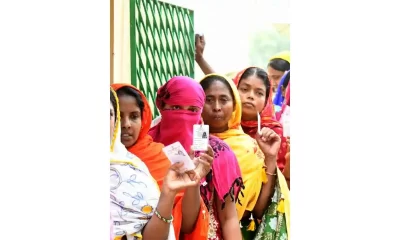
 2024 Lok Sabha Elections23 hours ago
2024 Lok Sabha Elections23 hours agoPrime Minister Narendra Modi urges citizens to vote in record numbers as voting for first phase of Lok Sabha elections begins on 102 seats across India
-

 Entertainment18 hours ago
Entertainment18 hours agoDo Aur Do Pyaar social media review: Social media users say Vidya Balan, Pratik Gandhi deliver standout performances in this adorable film
-
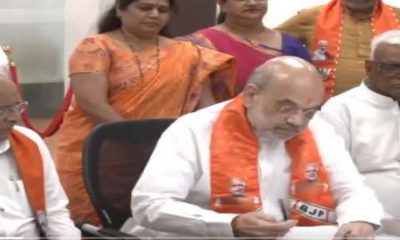
 2024 Lok Sabha Elections19 hours ago
2024 Lok Sabha Elections19 hours agoLok Sabha elections 2024: Amit Shah files nomination from Gandhinagar
-

 Entertainment19 hours ago
Entertainment19 hours agoYami Gautam starrer Article 370 releases on Netflix today
-
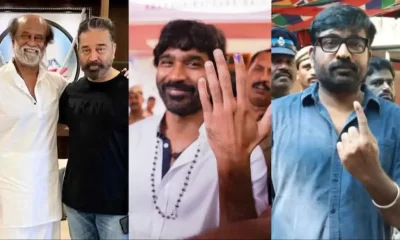
 2024 Lok Sabha Elections21 hours ago
2024 Lok Sabha Elections21 hours agoKamal Haasan, Rajinikanth, Vijay Sethupathi, Dhanush vote in Chennai
-

 2024 Lok Sabha Elections15 hours ago
2024 Lok Sabha Elections15 hours agoDeserted by key supporters, the Kamal Nath story looks set to wind to an end in Chhindwara
-

 2024 Lok Sabha Elections21 hours ago
2024 Lok Sabha Elections21 hours agoLok Sabha elections 2024: TMC, BJP workers clash in West Bengal’s Cooh Behar ahead of voting
-

 Entertainment16 hours ago
Entertainment16 hours agoAditya Roy Kapur, Sara Ali Khan’s Metro In Dino to release this November





